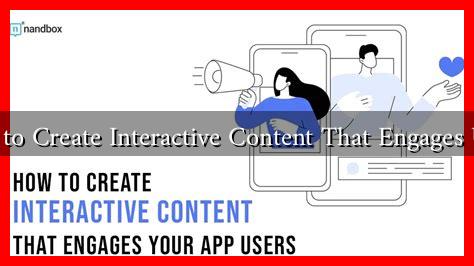-
Table of Contents
- How to Create Interactive Content That Engages Users
- Understanding Interactive Content
- Benefits of Interactive Content
- Steps to Create Engaging Interactive Content
- 1. Define Your Goals
- 2. Know Your Audience
- 3. Choose the Right Format
- 4. Design for User Experience
- 5. Promote Your Content
- Case Studies: Successful Interactive Content Examples
- Conclusion
How to Create Interactive Content That Engages Users
In today’s digital landscape, capturing user attention is more challenging than ever. With the average person exposed to thousands of marketing messages daily, businesses must find innovative ways to stand out. One effective strategy is to create interactive content that not only engages users but also encourages them to participate actively. This article explores how to create interactive content that captivates your audience and drives meaningful engagement.
Understanding Interactive Content
Interactive content refers to any type of content that requires active participation from the user. Unlike traditional content, which is often passive, interactive content invites users to engage, explore, and contribute. Examples include:
- Quizzes and polls
- Interactive infographics
- Calculators and tools
- Surveys and feedback forms
- Games and challenges
According to a study by the Content Marketing Institute, interactive content generates two times more conversions than passive content. This statistic underscores the importance of incorporating interactivity into your content strategy.
Benefits of Interactive Content
Creating interactive content offers several advantages that can enhance user engagement and improve brand loyalty:
- Increased Engagement: Interactive content encourages users to spend more time on your site, leading to higher engagement rates.
- Enhanced Learning: Users retain information better when they actively participate in the learning process.
- Data Collection: Interactive content can provide valuable insights into user preferences and behaviors.
- Social Sharing: Engaging content is more likely to be shared on social media, increasing your reach.
Steps to Create Engaging Interactive Content
Creating interactive content requires careful planning and execution. Here are some steps to guide you through the process:
1. Define Your Goals
Before creating interactive content, it’s essential to define your objectives. Are you looking to increase brand awareness, generate leads, or educate your audience? Clear goals will help shape your content strategy.
2. Know Your Audience
Understanding your target audience is crucial for creating relevant and engaging content. Conduct surveys, analyze user data, and create buyer personas to gain insights into their preferences and interests.
3. Choose the Right Format
Select a format that aligns with your goals and resonates with your audience. For example:
- If you want to educate, consider creating an interactive infographic.
- For lead generation, a quiz that provides personalized results can be effective.
- To gather feedback, use surveys or polls.
4. Design for User Experience
Ensure that your interactive content is visually appealing and easy to navigate. Use clear calls-to-action (CTAs) and intuitive design elements to guide users through the experience.
5. Promote Your Content
Once your interactive content is live, promote it through various channels, including social media, email newsletters, and your website. Consider collaborating with influencers or industry partners to expand your reach.
Case Studies: Successful Interactive Content Examples
Several brands have successfully leveraged interactive content to engage their audiences:
- BuzzFeed Quizzes: BuzzFeed’s quizzes are a prime example of interactive content that drives engagement. Their quizzes often go viral, generating significant traffic and social shares.
- HubSpot’s Marketing Grader: HubSpot offers a free tool that analyzes a user’s marketing efforts and provides personalized recommendations, effectively generating leads while providing value.
- National Geographic’s Interactive Maps: National Geographic uses interactive maps to engage users in exploring different regions and cultures, enhancing their educational content.
Conclusion
Creating interactive content is a powerful way to engage users and foster a deeper connection with your brand. By understanding your audience, defining clear goals, and choosing the right format, you can develop content that not only captures attention but also drives meaningful interactions. As demonstrated by successful case studies, the potential for increased engagement, data collection, and social sharing makes interactive content a valuable addition to any marketing strategy. Embrace the power of interactivity, and watch your audience engagement soar.
For more insights on interactive content strategies, check out Content Marketing Institute.

